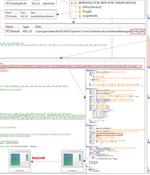Security News

Russian cyber-espionage group Turla, aka "Secret Blizzard," is utilizing other threat actors' infrastructure to target Ukrainian military devices connected via Starlink. [...]

The Russia-linked advanced persistent threat (APT) group known as Turla has been linked to a previously undocumented campaign that involved infiltrating the command-and-control (C2) servers of a...

An unnamed European Ministry of Foreign Affairs (MFA) and its three diplomatic missions in the Middle East were targeted by two previously undocumented backdoors tracked as LunarWeb and LunarMail....

The Russia-linked threat actor known as Turla has been observed using a new backdoor called TinyTurla-NG as part of a three-month-long campaign targeting Polish non-governmental organizations in...

Security researchers have identified and analyzed new malware they call TinyTurla-NG and TurlaPower-NG used by the Russian hacker group Turla to maintain access to a target's network and to steal sensitive data. According to the researchers, TinyTurla-NG is actively targeting multiple NGOs in Poland.

The Russia-linked hacking crew known as Turla has been observed using an updated version of a known second-stage backdoor referred to as Kazuar. The new findings come from Palo Alto Networks Unit...

Turla has been targeting defense sector organizations in Ukraine and Eastern Europe with DeliveryCheck and Kazuar backdoors / infostealers and has been using compromised Microsoft Exchange servers to control them. Turla APT. Turla is a sophisticated and persistent APT group that has been active for over 10 years and is believed to be sponsored by the Russian state.

The defense sector in Ukraine and Eastern Europe has been targeted by a novel. NET-based backdoor called DeliveryCheck that's capable of delivering next-stage payloads.

The US Government has been investigating Snake and Snake-related malware tools for nearly 20 years, and has monitored FSB officers assigned to Turla conducting daily operations using Snake from a known FSB facility in Ryazan, Russia. Although Snake has been the subject to several cybersecurity industry reports throughout its existence, Turla has applied numerous upgrades and revisions, and selectively deployed it, all to ensure that Snake remains Turla's most sophisticated long-term cyberespionage malware implant.

The Russian cyberespionage group known as Turla has been observed piggybacking on attack infrastructure used by a decade-old malware to deliver its own reconnaissance and backdoor tools to targets in Ukraine. Google-owned Mandiant, which is tracking the operation under the uncategorized cluster moniker UNC4210, said the hijacked servers correspond to a variant of a commodity malware called ANDROMEDA that was uploaded to VirusTotal in 2013.